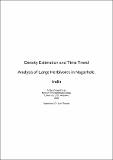Density estimation and time trend analysis of large herbivores in Nagarhole, India
Abstract
Density estimates for six large herbivore species were obtained through
analysis of line transect data from Nagarhole National Park, south-western India,
collected between 1989 and 2000. These species were Chital (Axis axis), Sambar
(Cervus unicolor), Gaur (Bos gaurus), Wild Pig (Sus scrofa), Muntjac (Muntiacus
muntjak) and Asian Elephant (Elephas maximus). Multiple Covariate Distance
Sampling (MCDS) models were used to derive these density estimates. The distance
histograms showed a relatively large spike at zero, which can lead to problems when
fitting MCDS models. The effects of this spike were investigated and remedied by
forward truncation. Density estimates from unmodified dataset were 10-15% higher
than estimates from the forward truncated data, with this going up to 37% for
Muntjac. These could possibly be over estimates. Empirical trend models were then
fit to the density estimates. Overall trends were stable, though there were intra-habitat
differences in trends for some species. The trends were similar both in cases where
forward truncation was done as well as in those where they were not.
Type
Thesis, MRes
Description
MRes in Environmental BiologyCollections
Items in the St Andrews Research Repository are protected by copyright, with all rights reserved, unless otherwise indicated.

